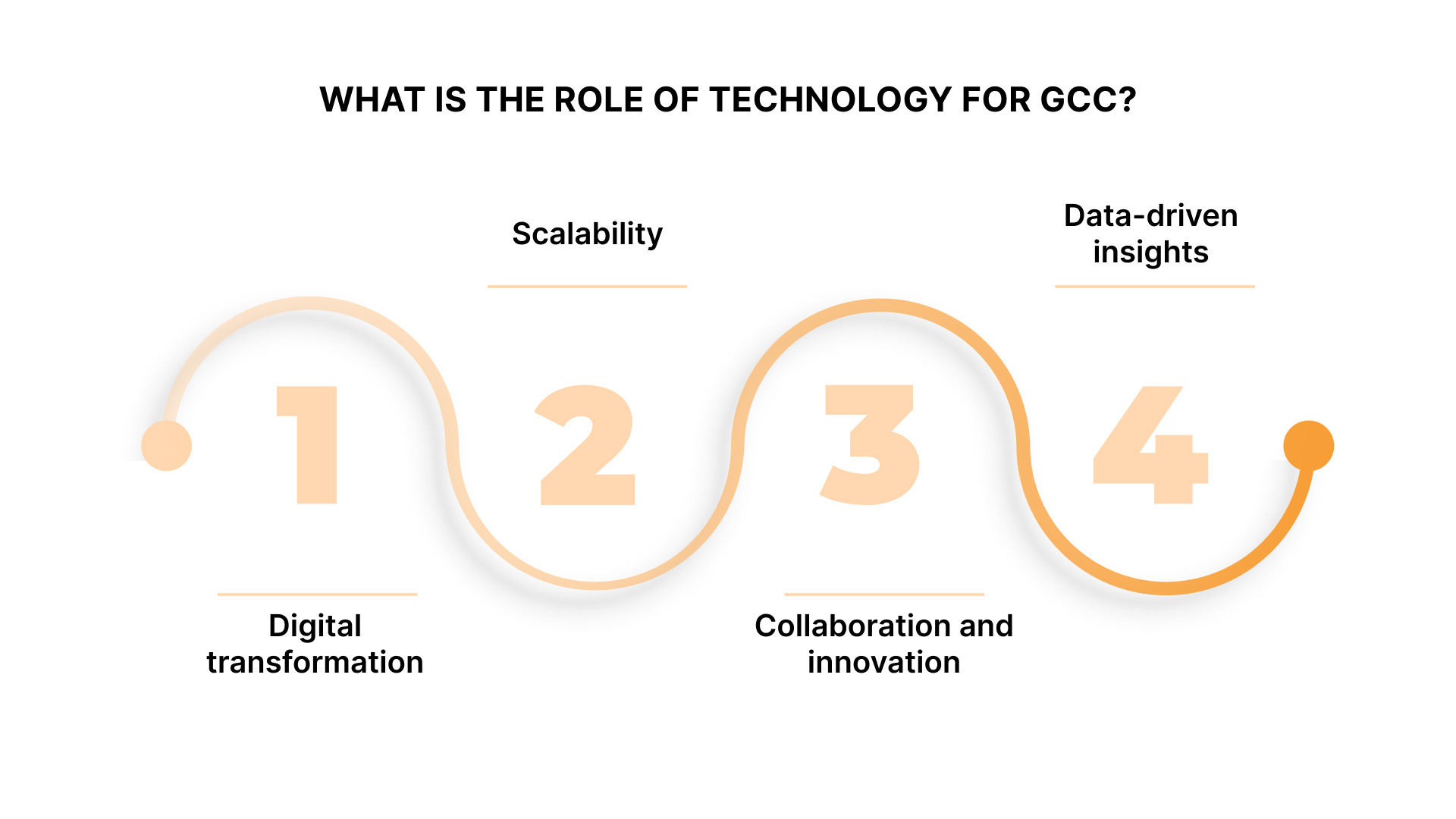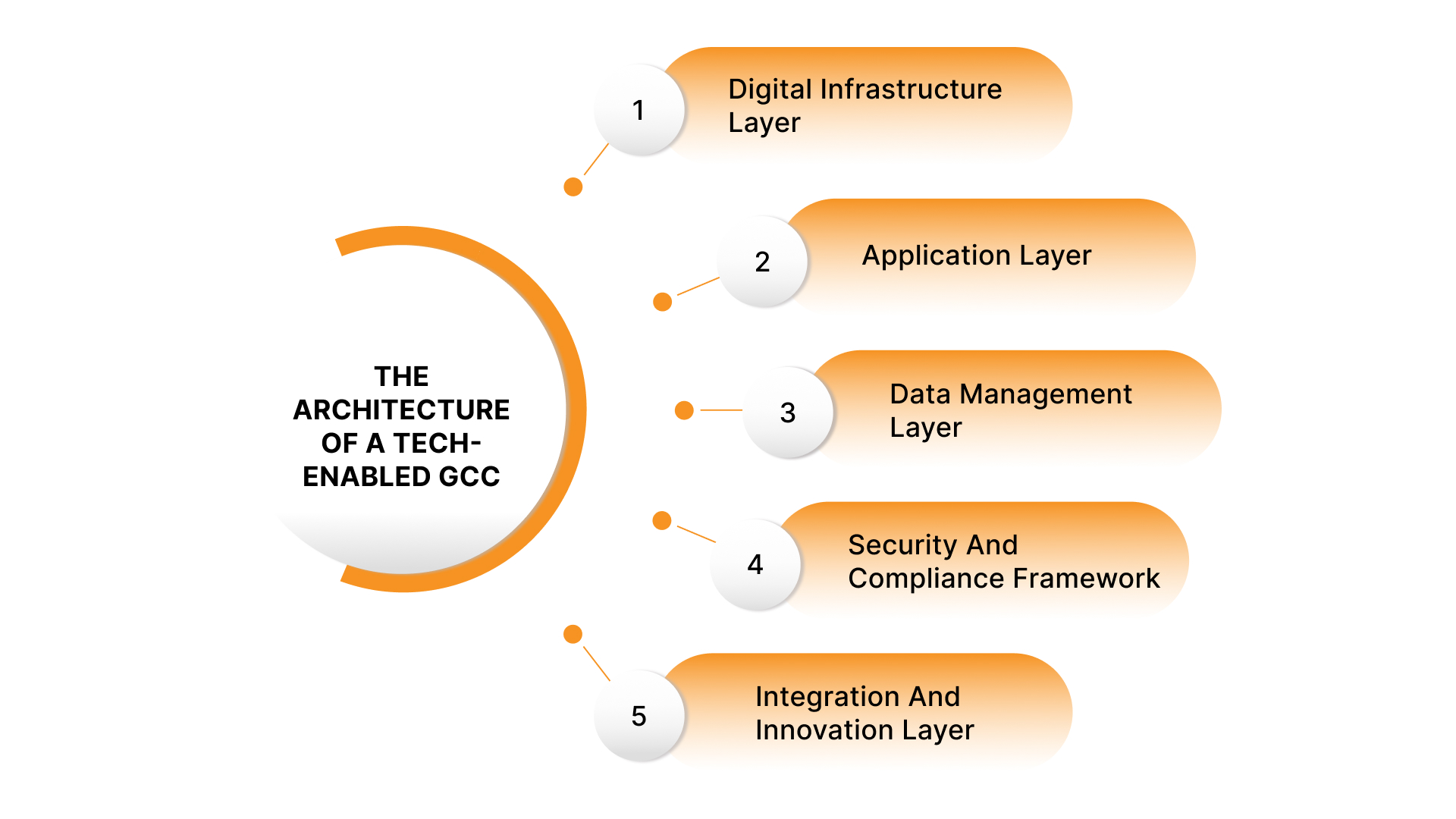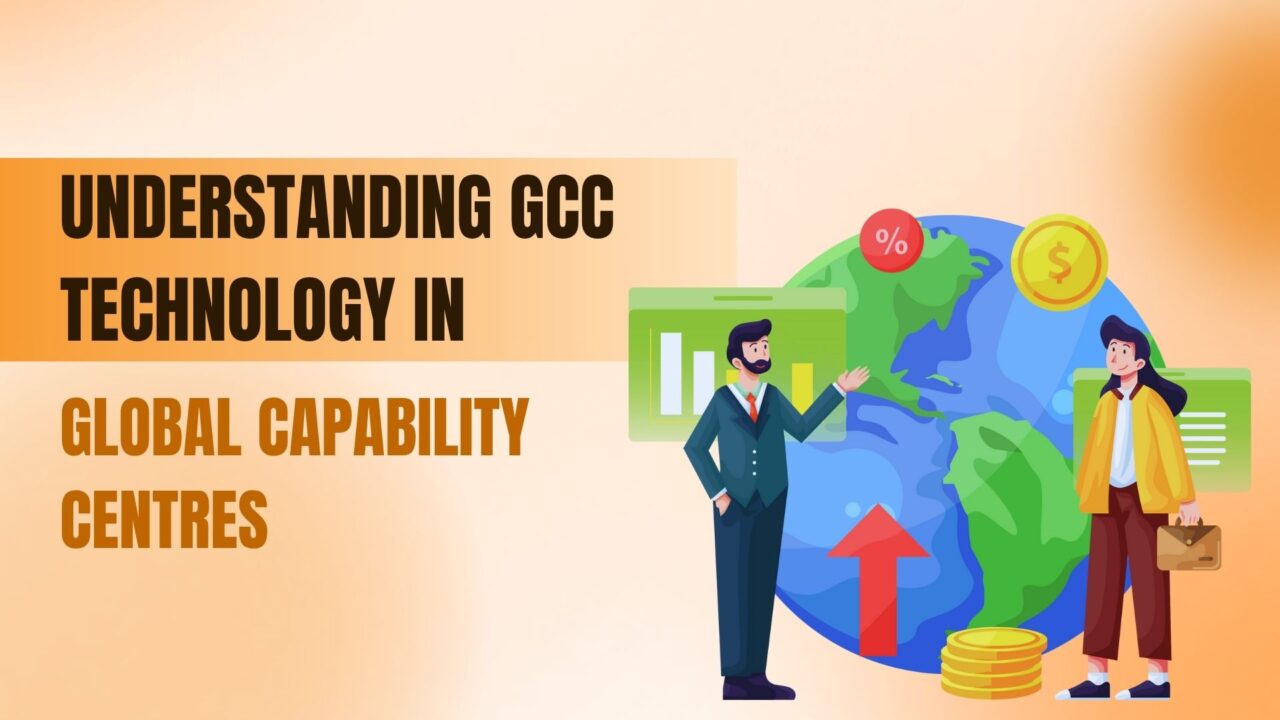Global Capability Centres (GCCs) have evolved far beyond their early identity as shared service hubs. Once viewed primarily as cost-optimisation units, today’s GCCs are strategic engines of innovation, product development, and digital transformation. In fact, India alone is emerging as a global powerhouse in this space, with its GCC market expected to reach $105 billion by 2030
In this transformation, technology serves as the backbone of every modern GCC. From data analytics and automation to AI-driven business processes and cloud infrastructure, technology shapes how these centres function, scale, and add value.
As businesses increasingly rely on digital infrastructure, the success of a GCC relies on its ability to build and sustain the right technological ecosystem supported by skilled talent.
At a Glance:
- GCCs have evolved from cost-focused centres into global innovation hubs powered by technologies such as AI, cloud, and analytics.
- Core technologies, including RPA, IoT, cybersecurity, and blockchain, actively drive automation, scalability, and collaboration across global operations.
- A strong digital infrastructure, robust data governance, and skilled talent form the foundation for building secure and agile GCCs.
- Strategic planning, agile adoption, and expert hiring support from V3 Staffing enable GCCs to accelerate their digital transformation journey.
What Are Global Capability Centres (GCCs)?
A Global Capability Centre (GCC) acts as a strategic entity established by enterprises, often multinationals, to provide a broad range of services such as IT, finance, human resources, analytics, or R&D functions under one roof. Over time, these centres have shifted from being simple cost-centres to becoming value-adding hubs that support innovation, product development, and global operations.
In the Indian context, GCCs have grown rapidly. India hosts more than 1,600 such centres, employing over 1.6 million professionals. Cities like Bengaluru, Hyderabad, Pune, and Chennai have become leading destinations due to their deep talent pools and strong technology infrastructure.
Also Read: GCC Growth in India: Key Drivers and Talent Impact
What is the Role of Technology for GCC?

Technology forms the foundation of modern GCCs. It enables them to deliver complex, high-value services with precision, scalability, and speed.
The role of technology in GCCs goes beyond supporting daily workflows; it defines and strengthens their entire operational strategy.
- Digital transformation: Advanced tools such as cloud computing, robotic process automation (RPA), and AI enable GCCs to automate repetitive tasks and focus on high-value work.
- Scalability: GCC technology helps centres expand their operations across multiple regions while maintaining consistent performance.
- Collaboration and innovation: Through digital platforms, teams in Hyderabad or Pune can collaborate effortlessly with global offices in the US, UK, or Europe.
- Data-driven insights: Integrated analytics systems empower leadership teams to make informed decisions faster.
As a result, technology positions GCCs as innovation accelerators, capable of designing, testing, and delivering products and services for global markets.
This shift underscores why having the right technical expertise and workforce is crucial, a goal that experienced partners like V3 Staffing help enterprises achieve efficiently.
9 Core Technologies Powering Modern GCCs
The success of a GCC largely depends on how effectively it integrates modern technologies into everyday operations. Let’s explore the core technologies that define today’s GCC ecosystem.
1. Artificial Intelligence (AI) and Machine Learning (ML)
AI and ML drive automation, analytics, and innovation across business functions in next-generation GCCs. These technologies enable teams to move beyond routine execution and focus on strategic innovation.
- Predictive Insights: AI algorithms analyse vast datasets to forecast trends, identify bottlenecks, and support faster, data-backed decisions.
- Process Automation: Machine learning models handle repetitive tasks such as invoice processing and customer queries, freeing employees to focus on higher-value work.
- Personalisation and Customer Insights: ML models enable GCCs to deliver tailored services, especially for enterprises managing large consumer data pools.
With Indian GCCs leading AI adoption across BFSI, healthcare, and retail, these technologies are transforming centres into engines of innovation.
2. Cloud Computing
Cloud computing empowers GCCs to scale operations seamlessly and work without geographical limits. It drives agility, cost-efficiency, and collaboration across global teams.
- Flexible Infrastructure: GCCs use cloud-based systems to scale up or down based on project needs without major capital investments.
- Collaboration at Scale: Platforms like Microsoft Azure and AWS enable real-time teamwork across hubs in Hyderabad, Pune, and Chennai.
- Data Security and Compliance: Cloud-native security frameworks ensure compliance with Indian and international data protection standards.
Through hybrid and multi-cloud strategies, Indian GCCs are reducing downtime, improving performance, and ensuring global operational consistency.
3. Robotic Process Automation (RPA)
RPA is transforming the way GCCs handle routine back-office tasks, allowing them to deliver faster and more accurate services to global stakeholders.
- Operational Efficiency: Software bots execute tasks like data entry, validation, and report generation faster and more accurately.
- Cost Optimisation: By automating back-office functions, GCCs reduce operating costs while maintaining service quality.
- Human Augmentation: RPA frees employees from routine work, enabling them to focus on innovation, analytics, and decision-making.
Across India’s leading GCC hubs, RPA is enabling operational agility and precision in finance, HR, and procurement.
4. Data Analytics and Business Intelligence (BI)
Modern GCCs thrive on insights, and data analytics empowers them to extract actionable intelligence from complex datasets.
- Real-Time Decision Support: BI dashboards offer leadership teams live metrics and predictive insights.
- Cross-Functional Insights: Advanced analytics unite data from multiple departments for a comprehensive view of operations.
- Innovation Acceleration: Data-driven models empower research and product development teams to design proactive strategies.
Indian GCCs are investing heavily in analytics talent and tools to turn raw data into actionable business value.
5. Cybersecurity and Risk Management
As GCCs handle sensitive global data, cybersecurity has become a non-negotiable priority. Advanced frameworks and AI-led threat detection form the backbone of digital protection.
- Threat Detection and Response: AI systems monitor anomalies and mitigate cyber risks before they escalate.
- Compliance with Global Standards: GCCs adhere to data privacy laws such as GDPR and align with Indian regulations.
- Employee Awareness: Regular security training strengthens the human layer of defence.
Cybersecurity teams across Delhi NCR and Hyderabad are ensuring uninterrupted, secure operations for global enterprises.
6. Internet of Things (IoT) and Smart Infrastructure
IoT is redefining how GCCs integrate physical and digital ecosystems. By connecting devices, sensors, and systems, IoT facilitates smarter operations and real-time insights.
- Connected Infrastructure: IoT-enabled systems track equipment performance and optimise energy use across hubs in Chennai and Bengaluru.
- Remote Monitoring: Enterprises oversee multiple global operations in real time, ensuring greater control and responsiveness.
- Predictive Maintenance: IoT data helps forecast potential issues before they disrupt operations.
By combining IoT with analytics and AI, GCCs in India are building intelligent, self-optimising infrastructures.
7. Blockchain and Distributed Ledger Technology
Blockchain is transforming how GCCs manage transactions, data integrity, and compliance processes.
- Transparent Operations: Immutable ledgers provide verifiable transactions and data records.
- Cross-Border Collaboration: Blockchain simplifies documentation and compliance across multiple geographies.
- Fraud Reduction: Its decentralised nature reduces data tampering and cyber risk.
Indian GCCs exploring blockchain in supply chain, finance, and contract management are leading secure digital transformation.
8. Enterprise Resource Planning (ERP) and Integrated Platforms
ERP systems provide the structural foundation for unified, cross-departmental coordination within GCCs.
- Centralised Management: ERP integrates finance, HR, and supply chain data for seamless visibility.
- Automation of Core Functions: Standardised workflows ensure consistency and compliance across business units.
- Data-Driven Operations: Built-in analytics help detect inefficiencies and drive improvement.
GCCs are upgrading legacy ERP systems to cloud-based platforms, achieving flexibility without compromising security.
9. Collaboration and Productivity Tools
For GCCs operating across time zones and continents, collaboration tools are vital to maintaining communication and performance.
- Unified Communication: Platforms like Microsoft Teams and Slack enable smooth collaboration across geographies.
- Knowledge Management: Centralised repositories preserve organisational knowledge and prevent duplication.
- Hybrid Work Enablement: Digital tools support flexible work models that enhance engagement and productivity.
GCCs in cities like Mumbai and Bengaluru are using these digital platforms to build cohesive, high-performing teams that drive innovation.
Together, these technologies form the foundation of GCC technology, enabling
scalability, agility, and innovation across all levels of operation.
The Architecture of a Tech-Enabled GCC

GCCs operate through a structured framework that integrates people, processes, and platforms into a unified digital ecosystem. This architecture ensures that every layer, from infrastructure to innovation, supports business continuity, security, and agility.
A tech-enabled GCC architecture typically consists of several layers and components:
1. Digital Infrastructure Layer
The digital infrastructure forms the foundation of every tech-enabled GCC. This layer combines servers, networks, and cloud environments that power always-on operations and hybrid work models.
It delivers scalable computing power and secure connectivity, enabling GCC teams across cities like Hyderabad, Bengaluru, and Chennai to collaborate seamlessly in real time. Strong infrastructure drives flexibility and reliability in daily operations.
2. Application Layer
Sitting above the infrastructure is the application layer, which hosts enterprise systems and productivity tools. This includes ERP, CRM, HRMS, and other business-critical platforms that streamline workflows across departments.
It’s where daily business functions, from finance to human resources, are executed with consistency and transparency, helping teams align on shared goals.
3. Data Management Layer
Modern GCCs rely heavily on data, and this layer manages how that data is collected, processed, and stored. It ensures accuracy, accessibility, and compliance with both local and international regulations.
Advanced analytics tools and databases in this layer help organisations transform raw data into actionable insights, driving better decision-making and innovation.
4. Security and Compliance Framework
Security forms a built-in layer across every GCC component rather than remaining an afterthought. This framework actively protects sensitive data through encryption, access controls, and continuous monitoring.
It also ensures full compliance with global privacy regulations such as GDPR. For enterprises operating across multiple geographies, this framework builds confidence to function securely at scale.
5. Integration and Innovation Layer
At the top, the integration and innovation layer connects technologies through APIs, microservices, and AI-driven systems, forming an agile, cohesive ecosystem.
This setup empowers GCCs to experiment with new tools, accelerate product development, and integrate emerging technologies, all without disrupting existing workflows.
Together, these layers build a dynamic and resilient foundation, allowing GCCs to function as independent yet aligned extensions of global enterprises.
Also Read: How GCC Works: A Strategic Guide for Indian Enterprises
Challenges in Implementing GCC Technology
Building a technology-driven GCC in India demands careful planning and expert guidance to overcome operational and strategic complexities. Some common challenges include:
- Legacy Infrastructure: Many established GCCs still rely on outdated systems that limit digital transformation. Upgrading these while maintaining business continuity is a common challenge.
- Shortage of Skilled Tech Talent: Finding and retaining skilled professionals in AI, data science, and cloud security is one of the biggest barriers to GCC growth. With the competition for top talent in cities like Bengaluru and Chennai intensifying, recruitment precision becomes crucial.
- Integration Complexity: Connecting global systems with local GCC operations often leads to compatibility and governance challenges. Ensuring consistent data standards across regions adds another layer of difficulty.
- Compliance and Security Risks: GCCs must meet stringent global and local compliance standards such as GDPR, ISO, and SOC2. Managing sensitive data across distributed teams demands constant monitoring and advanced cybersecurity controls.
- High Implementation Costs: Initial investments in technologies like cloud, AI, and cybersecurity can be high, making strategic budgeting and vendor partnerships essential.
Addressing these challenges requires both technological foresight and access to the right talent, a combination that defines successful GCC operations.
Best Practices for Implementing GCC Technology
Successful GCCs approach technology not as a one-time investment but as a long-term strategic framework. The following practices help build scalable, future-ready GCCs that deliver consistent value.
- Define a Clear Technology Strategy: Before adopting new tools, GCCs must establish a technology vision aligned with business objectives. This roadmap should cover infrastructure, skills, and process integration.
- Build the Right Team: A GCC’s success depends on its people. Building skilled teams across cloud engineering, automation, cybersecurity, and analytics is essential. Here, partnerships with specialised hiring firms like V3 Staffing can accelerate recruitment while maintaining quality and compliance.
- Prioritise Data Security: Strong data protection frameworks, encryption, regular audits, and multi-level access controls help GCCs reduce risks and maintain trust.
- Adopt an Agile Implementation Model: Rather than deploying technologies all at once, GCCs should use agile, phased rollouts. This enables teams in Hyderabad, Pune, and Chennai to experiment, gather feedback, and improve adoption rates.
- Invest in Upskilling and Training: Ongoing learning initiatives ensure that GCC talent stays current with evolving technologies. Many leading centres have in-house learning academies focusing on cloud, AI, and analytics.
- Establish Strong Governance: Transparent reporting and accountability systems, with SLAs and regular performance tracking, ensure long-term stability and value delivery.
By following these practices, enterprises can convert their GCCs from cost-centres into strategic technology-driven hubs that support global operations.
How V3 Staffing Enables Tech-Led GCC Transformation?
V3 Staffing supports global capability centres with tailored workforce and technology recruitment solutions that align with their digital transformation goals. The firm bridges skill gaps, accelerates tech adoption, and enables scalable growth through specialised services:
- Permanent Recruitment: Specialised hiring for mid-to-senior professionals across technology and core business functions, ensuring long-term team stability.
- IT Staffing: Access to niche technology experts, such as cloud, data, and software specialists, to strengthen GCCs’ digital capabilities.
- Temporary & Contract Staffing: Flexible models for short-term or project-based needs, helping GCCs scale teams quickly and cost-effectively.
- Recruitment Process Outsourcing (RPO): Dedicated teams managing end-to-end hiring under defined SLAs, optimising recruitment efficiency and speed.
- Executive Search: Targeted hiring for CXO and leadership positions to build high-impact teams for strategic and tech-driven growth.
By combining deep domain expertise with an extensive talent network, V3 Staffing empowers GCCs to scale efficiently and strengthen their position as global technology hubs.
Conclusion
Global Capability Centres are redefining enterprise success by combining technology, talent, and innovation. From automation and AI to data analytics and cybersecurity, GCC technology is driving smarter, faster, and more connected operations across industries.
Yet, the real differentiator lies not only in the technology itself but in the people who design, build, and maintain it. V3 Staffing helps enterprises bridge this gap by providing access to skilled professionals who drive performance and innovation across GCCs.
Looking to build a future-ready, tech-driven GCC in India? Contact us today to connect with the right talent and accelerate your digital transformation journey.
Frequently Asked Questions
Q. What are the core technological pillars supporting modern GCCs?
A. Modern GCCs rely on cloud computing, AI and automation, advanced analytics, cybersecurity, and enterprise integration tools. These technologies enable scalability, real-time insights, and efficient collaboration across global teams, driving innovation and operational excellence.
Q. How do GCCs integrate DevOps and agile methodologies into technology management?
A. GCCs adopt DevOps and agile frameworks to accelerate product development, automate workflows, and enhance cross-functional collaboration. Continuous integration, rapid testing, and iterative delivery cycles improve software quality and reduce time-to-market while aligning technology initiatives with business goals.
Q. What impact do digital twins and predictive analytics have on GCC performance?
A. Digital twins and predictive analytics enhance GCC efficiency by simulating processes, forecasting outcomes, and preventing failures. These tools enable real-time performance monitoring, data-driven decision-making, and optimised resource utilization, leading to greater agility and reduced operational costs.
Q. What are the key technology metrics used to measure GCC success?
A. GCCs measure success through metrics such as system uptime, deployment frequency, automation rate, mean time to resolution (MTTR), and innovation ROI. These indicators reflect operational efficiency, agility, and the effectiveness of technology-driven transformation initiatives.
Q. How are GCCs adapting to sustainability goals through green technologies?
A. GCCs embrace green technologies like energy-efficient data centres, cloud optimization, and AI-based energy monitoring to reduce carbon footprints. They integrate sustainability into operations by adopting circular IT practices, optimising resource use, and aligning with global environmental standards.




